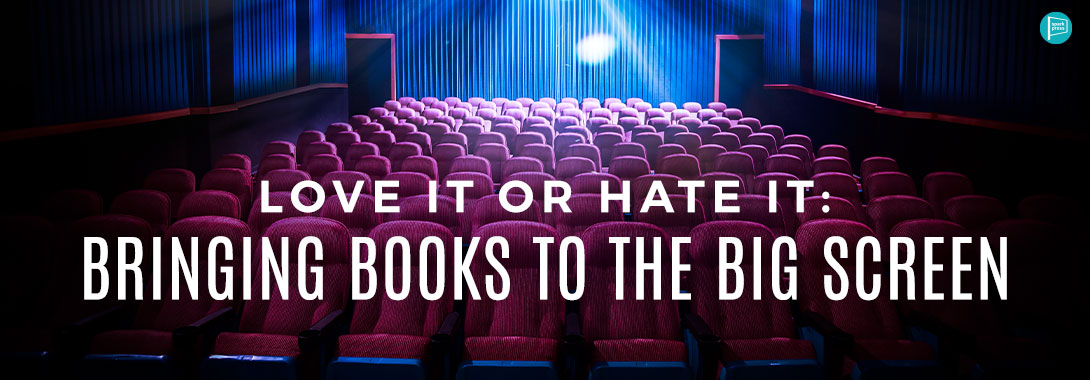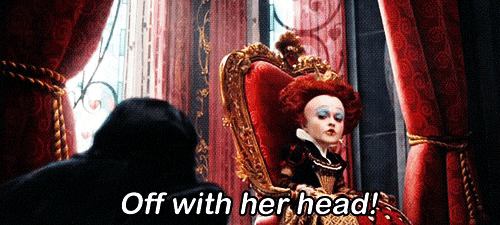
Nowadays, it seems like the majority of the trailers we see in the movie theater are based on our favorite novels. Though some of these adaptations are spectacular displays that reinvigorate our love for the stories on our book shelves, other films aren’t so lucky. So what determines the fate of a book-to-movie adaptation?
What We Hate
Though we always hope that adaptations will live up to our grand expectations, sometimes we don’t leave the theater quite as pleased as we’d hoped.
 “They cut that?!” is never a sentence you want to say during a movie adaptation of your favorite book. Tragically, a four-hundred-page novel never translates perfectly into a two-hour film time. And so more often than not, book fans are clicking their tongues in their seats when their favorite scene is left out. Unfortunately, there are few typical movie-goers willing to sit still for five hours for the sake of perfect accuracy.
“They cut that?!” is never a sentence you want to say during a movie adaptation of your favorite book. Tragically, a four-hundred-page novel never translates perfectly into a two-hour film time. And so more often than not, book fans are clicking their tongues in their seats when their favorite scene is left out. Unfortunately, there are few typical movie-goers willing to sit still for five hours for the sake of perfect accuracy.
 Budgets are rough. When writing a book, an author is not constrained by a budget. It didn’t cost anything for Michael Crichton to write dinosaurs into Jurassic Park, but Universal Studios spent over sixty million dollars on its efforts to carry the dinos to the big screen. Though Crichton’s book became arguably one of the most beloved adaptations of all time, it might not have been so impressive if the project hadn’t been backed by a massive studio. Imagine instead of life-like animatronics, we saw a Barney costume. It’s difficult for book-to-movie adaptations to succeed when studios don’t have the funding to accomplish the level of hype we’ve built inside our heads.
Budgets are rough. When writing a book, an author is not constrained by a budget. It didn’t cost anything for Michael Crichton to write dinosaurs into Jurassic Park, but Universal Studios spent over sixty million dollars on its efforts to carry the dinos to the big screen. Though Crichton’s book became arguably one of the most beloved adaptations of all time, it might not have been so impressive if the project hadn’t been backed by a massive studio. Imagine instead of life-like animatronics, we saw a Barney costume. It’s difficult for book-to-movie adaptations to succeed when studios don’t have the funding to accomplish the level of hype we’ve built inside our heads.
 Greed isn’t cute. Speaking of money, one of the most frustrating things for an adaptation is when studios are clearly making changes to a story in the hopes of making more money. Unwarranted changes are annoying on their own, but it’s especially aggravating when character detail is significantly altered. Also if the story themes are compromised in an attempt to appeal to a broader audience or a single novel gets unnecessarily stretched into three movies because Hollywood executives know people will shell out the money to see them. When we sense pandering, we walk out of theaters feeling swindled instead of satisfied.
Greed isn’t cute. Speaking of money, one of the most frustrating things for an adaptation is when studios are clearly making changes to a story in the hopes of making more money. Unwarranted changes are annoying on their own, but it’s especially aggravating when character detail is significantly altered. Also if the story themes are compromised in an attempt to appeal to a broader audience or a single novel gets unnecessarily stretched into three movies because Hollywood executives know people will shell out the money to see them. When we sense pandering, we walk out of theaters feeling swindled instead of satisfied.
What We Love
Even though there is no shortage of terrible movie adaptations, there are enough successes to make us keep coming back for more. So, what makes us love seeing our favorite books hit the big screen?
 Staying faithful is the key. Book-to-movie adaptations work best when they’re true to the book. For those diehard fans of the original story, one of the most satisfying things in the world is when a treasured book is translated faithfully to film. There’s nothing like the gratification of your favorite characters hitting the big screen and living up to the image of them you have in your head. Gone With the Wind was one of the most successful selling movies of all time in the box office for a reason. Vivien Leigh and Clark Gable perfectly captured the spirits of Scarlett O’Hara and Rhett Butler. The plot was loyal to the Pulitzer Prize-winning novel, and the core messages and themes of the story were honored by the director. A movie adaptation has the power to blow us away when it pays attention to the details of a book we already adore.
Staying faithful is the key. Book-to-movie adaptations work best when they’re true to the book. For those diehard fans of the original story, one of the most satisfying things in the world is when a treasured book is translated faithfully to film. There’s nothing like the gratification of your favorite characters hitting the big screen and living up to the image of them you have in your head. Gone With the Wind was one of the most successful selling movies of all time in the box office for a reason. Vivien Leigh and Clark Gable perfectly captured the spirits of Scarlett O’Hara and Rhett Butler. The plot was loyal to the Pulitzer Prize-winning novel, and the core messages and themes of the story were honored by the director. A movie adaptation has the power to blow us away when it pays attention to the details of a book we already adore.
 It’s called “movie magic” for a reason. Movies can transform words on a page into larger-than-life experiences. Think of the exuberance you felt seeing the quidditch game for the first time in the film adaptation of J. K. Rowling’s Harry Potter and the Sorcerer’s Stone. Think of your awe when you beheld the grandeur of Middle-earth in J. R. R. Tolkien’s The Lord of the Rings spanning over a screen. Think how terrified you were when Pennywise from Stephen King’s IT appeared in the gutter. When they’re done well, book-to-movie adaptations have the potential to blow us away and bring our imagination to life.
It’s called “movie magic” for a reason. Movies can transform words on a page into larger-than-life experiences. Think of the exuberance you felt seeing the quidditch game for the first time in the film adaptation of J. K. Rowling’s Harry Potter and the Sorcerer’s Stone. Think of your awe when you beheld the grandeur of Middle-earth in J. R. R. Tolkien’s The Lord of the Rings spanning over a screen. Think how terrified you were when Pennywise from Stephen King’s IT appeared in the gutter. When they’re done well, book-to-movie adaptations have the potential to blow us away and bring our imagination to life.

We can share what we love. It’s not a secret that film adaptations can make the most beloved stories accessible to a wider audience. That’s one of the things we appreciate the most about successful book-to-movie adaptations. Of course, we are big advocates for reading—“the book was better” is an age-old proverb for a reason. One of the biggest benefits of movie adaptations is that non-readers can still experience an amazing story. And hopefully even get inspired to pick up the book in the future.

Leave A Comment